Abstract
Recent reports have thrown doubt on both of the major mechanisms which have been suggested for the regression of breast cancer under high-dosage oestrogen therapy—a direct effect on binding sites and an indirect inhibition of prolactin release. A searching review on the clinical response of 407 patients with advanced breast cancer treated by oestrogen therapy under my direction showed certain anomalies, including age determined tumour inhibition and stimulation, dose dependence of tumour inhibition and stimulation, differential site sensitivity, and tumour regression with oestrogen withdrawal. The hypothesis usually postulated to explain these anomalies is that the tumour may in the same individual be composed of multiple genetically distinct clones of cells. It is suggested instead that the effect of high-dosage oestrogen therapy in breast cancer may depend critically on the absolute and relative concentrations of prolactin and oestrogen actively available at the tumour. On this basis the clinical manifestation of tumour stimulation in response to oestrogen administration suggests that the oestrogen concentration at the target is inadequate. Differences in site sensitivity in the same patient may depend on tumoral factors such as the level of oestradiol and prolactin binding receptors in the tissue.
Full text
PDF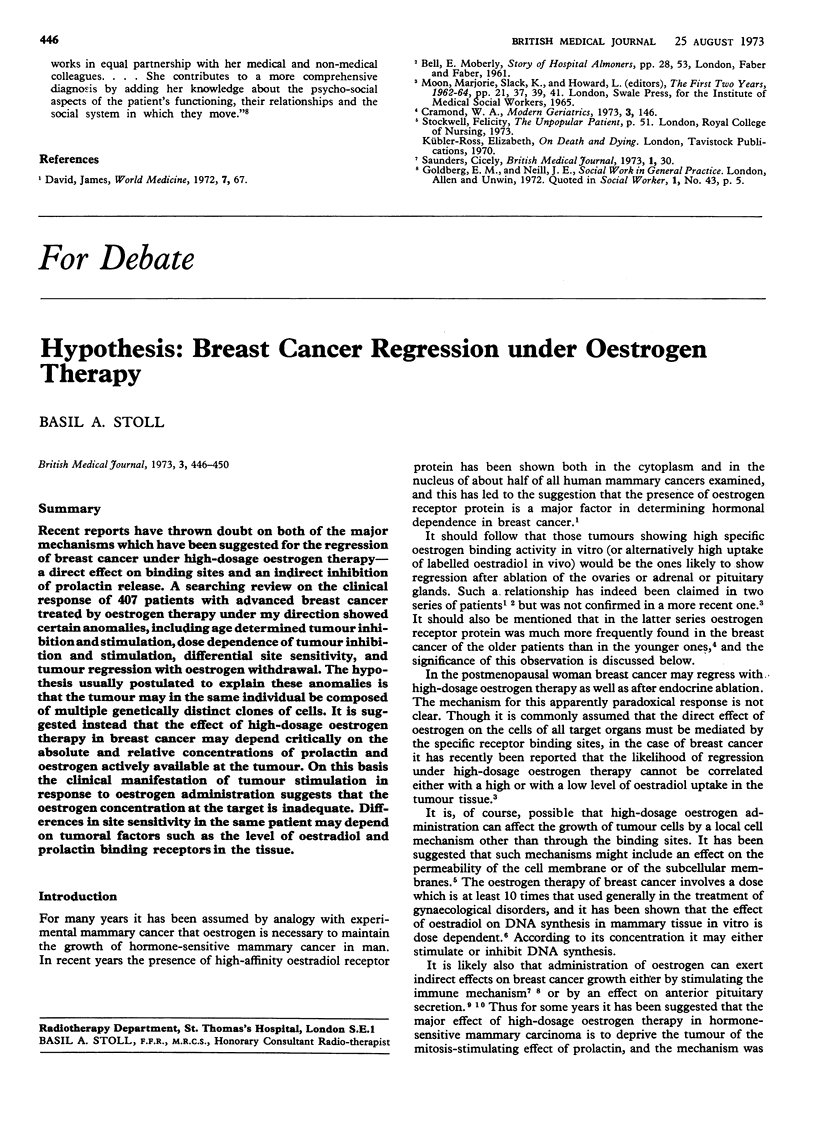
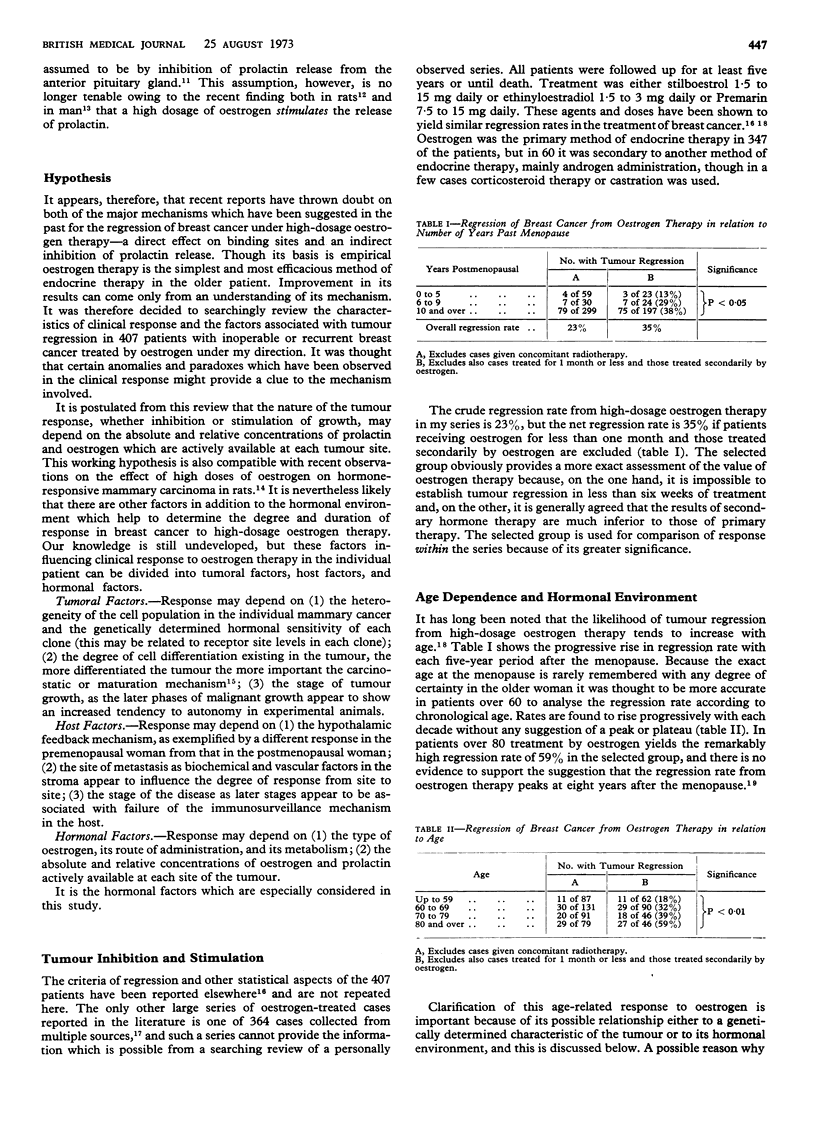
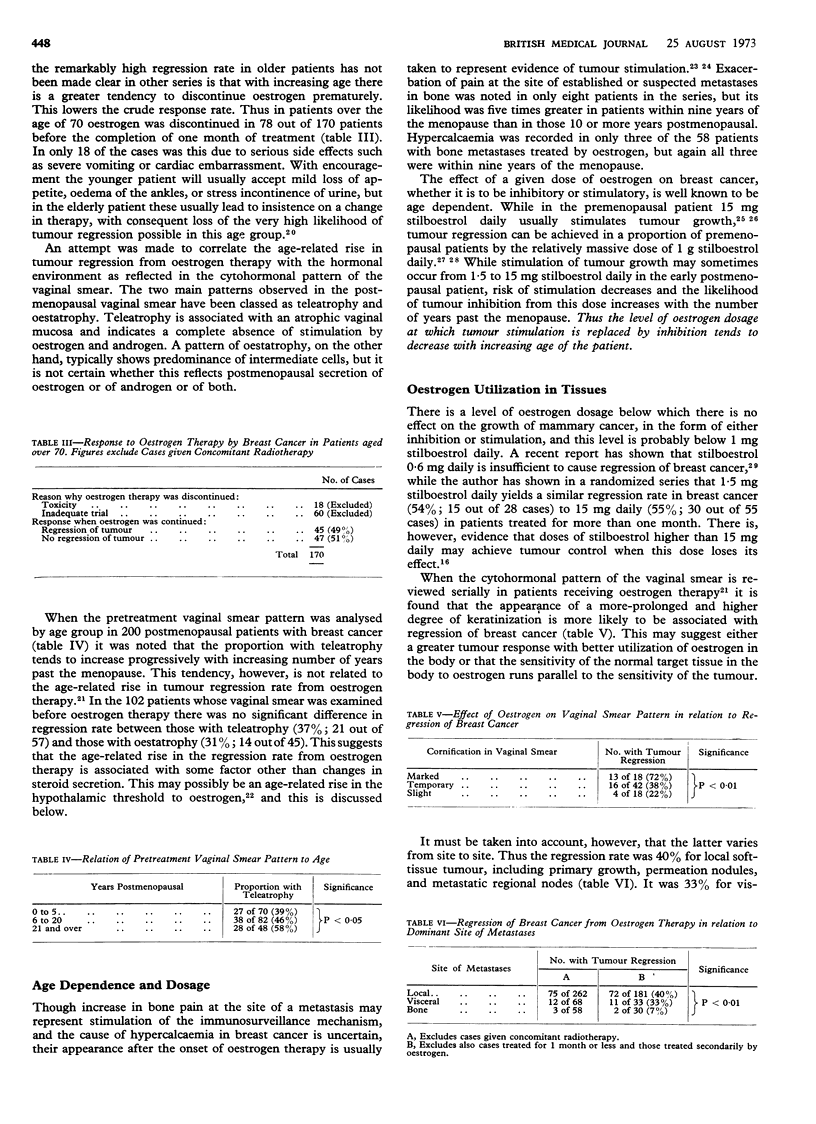
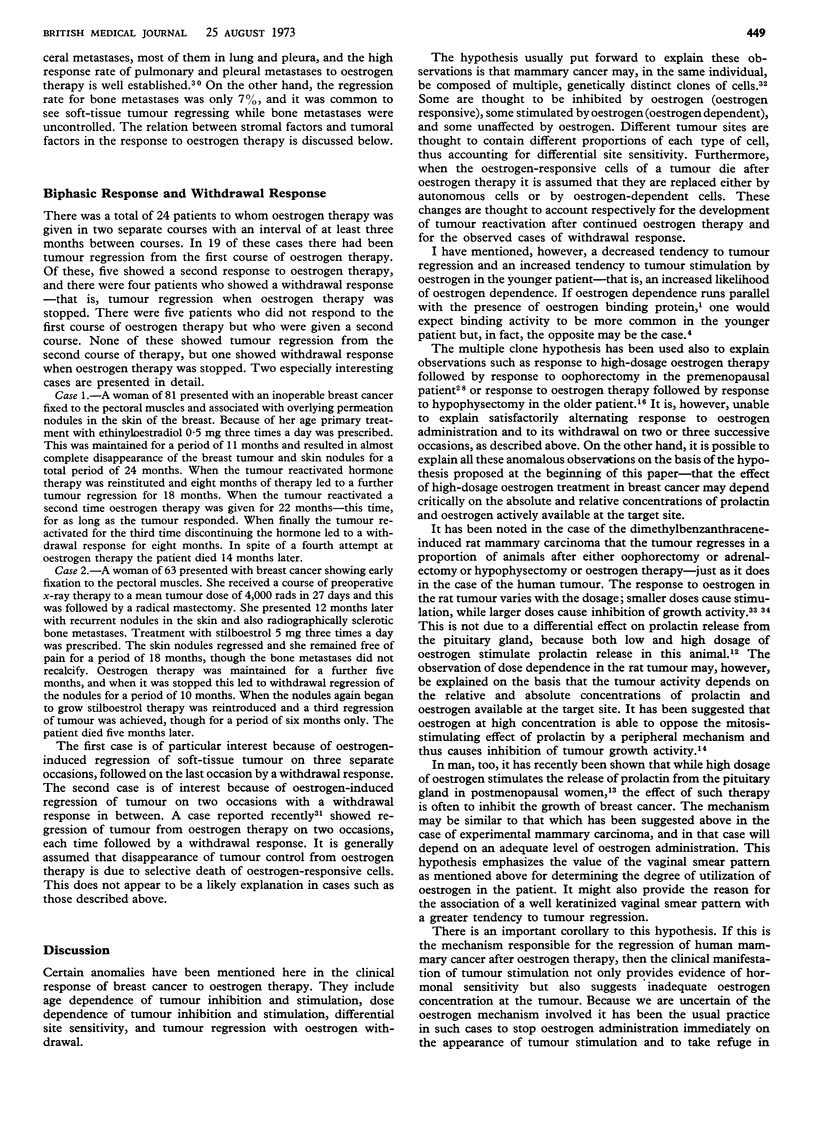
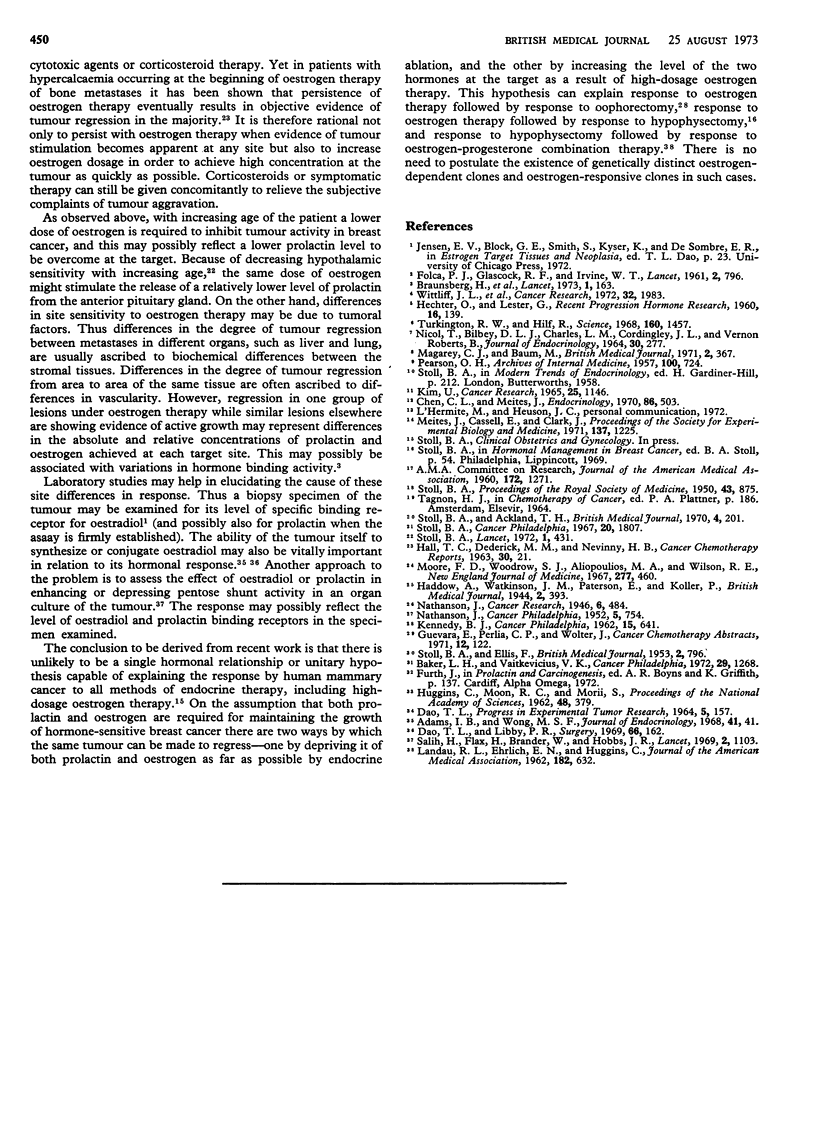
Selected References
These references are in PubMed. This may not be the complete list of references from this article.
- Baker L. H., Vaitkevicius V. K. Reevaluation of rebound regression in disseminated carcinoma of the breast. Cancer. 1972 May;29(5):1268–1271. doi: 10.1002/1097-0142(197205)29:5<1268::aid-cncr2820290521>3.0.co;2-o. [DOI] [PubMed] [Google Scholar]
- Braunsberg H., James V. H., Irvine W. T., Jamieson C. W., James F., Sellwood R. A., Carter A. E., Hulbert M. Prognostic significance of oestrogen uptake by human breast-cancer tissue. Lancet. 1973 Jan 27;1(7796):163–165. doi: 10.1016/s0140-6736(73)90001-9. [DOI] [PubMed] [Google Scholar]
- Chen C. L., Meites J. Effects of estrogen and progesterone on serum and pituitary prolactin levels in ovariectomized rats. Endocrinology. 1970 Mar;86(3):503–505. doi: 10.1210/endo-86-3-503. [DOI] [PubMed] [Google Scholar]
- Dao T. L., Libby P. R. Conjugation of steroid hormones by breast cancer tissue and selection of patients for adrenalectomy. Surgery. 1969 Jul;66(1):162–166. [PubMed] [Google Scholar]
- FOLCA P. J., GLASCOCK R. F., IRVINE W. T. Studies with tritium-labelled hexoestrol in advanced breast cancer. Comparison of tissue accumulation of hexoestrol with response to bilateral adrenalectomy and oophorectomy. Lancet. 1961 Oct 7;2(7206):796–798. doi: 10.1016/s0140-6736(61)91088-1. [DOI] [PubMed] [Google Scholar]
- HALL T. C., DEDERICK M. M., NEVINNY H. B. PROGNOSTIC VALUE OF HORMONALLY INDUCED HYPERCALCEMIA IN BREAST CANCER. Cancer Chemother Rep. 1963 Jul;30:21–23. [PubMed] [Google Scholar]
- HECHTER O., LESTER G. Cell permeability and hormone action. Recent Prog Horm Res. 1960;16:139–186. [PubMed] [Google Scholar]
- HUGGINS C., MOON R. C., MORII S. Extinction of experimental mammary cancer. I. Estradiol-17beta and progesterone. Proc Natl Acad Sci U S A. 1962 Mar 15;48:379–386. doi: 10.1073/pnas.48.3.379. [DOI] [PMC free article] [PubMed] [Google Scholar]
- KENNEDY B. J. Massive estrogen administration in premenopausal women with metastatic breast cancer. Cancer. 1962 May-Jun;15:641–648. doi: 10.1002/1097-0142(196205/06)15:3<641::aid-cncr2820150330>3.0.co;2-9. [DOI] [PubMed] [Google Scholar]
- LANDAU R. L., EHRLICH E. N., HUGGINS C. Estradiol benzoate and progesterone in advanced human-breast cancer. A combination found effective in advanced cases. JAMA. 1962 Nov 10;182:632–636. [PubMed] [Google Scholar]
- Magarey C. J., Baum M. Oestrogen as a reticuloendothelial stimulant in patients with cancer. Br Med J. 1971 May 15;2(5758):367–370. doi: 10.1136/bmj.2.5758.367. [DOI] [PMC free article] [PubMed] [Google Scholar]
- Meites J., Cassell E., Clark J. Estrogen inhibition of mammary tumor growth in rats; counteraction by prolactin. Proc Soc Exp Biol Med. 1971 Sep;137(4):1225–1227. doi: 10.3181/00379727-137-35760. [DOI] [PubMed] [Google Scholar]
- Moore F. D., Woodrow S. I., Aliapoulios M. A., Wilson R. E. Carcinoma of the breast. A decade of new results with old concepts. N Engl J Med. 1967 Aug 31;277(9):460–concl. doi: 10.1056/NEJM196708312770904. [DOI] [PubMed] [Google Scholar]
- NATHANSON I. T. Clinical investigative experience with steroid hormones in breast cancer. Cancer. 1952 Jul;5(4):754–762. doi: 10.1002/1097-0142(195207)5:4<754::aid-cncr2820050416>3.0.co;2-b. [DOI] [PubMed] [Google Scholar]
- NICOL T., BILBEY D. L., CHARLES L. M., CORDINGLEY J. L., VERNON-ROBERTS B. OESTROGEN: THE NATURAL STIMULANT OF BODY DEFENCE. J Endocrinol. 1964 Oct;30:277–291. doi: 10.1677/joe.0.0300277. [DOI] [PubMed] [Google Scholar]
- STOLL B. A., ELLIS F. Treatment by oestrogens of pulmonary metastases from breast cancer. Br Med J. 1953 Oct 10;2(4840):796–800. doi: 10.1136/bmj.2.4840.796. [DOI] [PMC free article] [PubMed] [Google Scholar]
- STOLL B. A. Hormone therapy in relation to radiotherapy in the treatment of advanced carcinoma of the breast. Proc R Soc Med. 1950 Nov;43(11):875–882. [PMC free article] [PubMed] [Google Scholar]
- Salih H., Brander W., Flax H., Hobbs J. R. Prolactin dependence in human breast cancers. Lancet. 1972 Nov 25;2(7787):1103–1105. doi: 10.1016/s0140-6736(72)92713-4. [DOI] [PubMed] [Google Scholar]
- Stoll B. A., Ackland T. H. Management of breast cancer in old age. Br Med J. 1970 Oct 24;4(5729):201–203. doi: 10.1136/bmj.4.5729.201. [DOI] [PMC free article] [PubMed] [Google Scholar]
- Stoll B. A. Brain catecholamines and breast cancer: a hypothesis. Lancet. 1972 Feb 19;1(7747):431–431. doi: 10.1016/s0140-6736(72)90875-6. [DOI] [PubMed] [Google Scholar]
- Stoll B. A. Vaginal cytology as an aid to hormone therapy in postmenopausal cancer of the breast. Cancer. 1967 Oct;20(10):1807–1813. doi: 10.1002/1097-0142(196710)20:10<1807::aid-cncr2820201033>3.0.co;2-2. [DOI] [PubMed] [Google Scholar]
- Turkington R. W., Hilf R. Hormonal dependence of DNA synthesis in mammary carcinoma cells in vitro. Science. 1968 Jun 28;160(3835):1457–1459. doi: 10.1126/science.160.3835.1457. [DOI] [PubMed] [Google Scholar]


